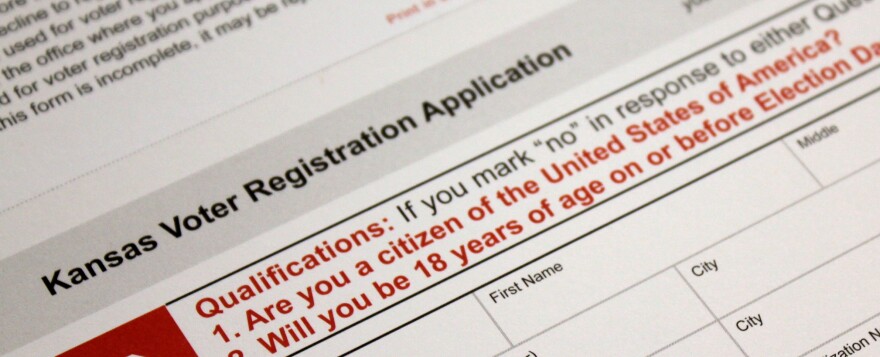Kansas Secretary of State Kris Kobach has championed laws restricting voting that are rippling across the country. The conservative Republican argues the tough laws on voting eligibility are needed to protect elections against fraud, but critics contend such restrictions are unnecessary and suppress voter turnout, particularly among the young and minority voters.
Arizona enacted the nation's first proof of citizenship law in 2004, followed by similar laws in Kansas, Georgia and Alabama.
Here's a look at the political and legal fight over voting laws that require documentary proof of U.S. citizenship:
- March 29, 2011: The Kansas Legislature passes an elections reform bill, the "Secure and Fair Elections Act," which requires people to provide evidence of U.S. citizenship such as a passport, birth certificate or naturalization papers in order to register to vote.
- Jan. 1, 2013: The "SAFE Act" goes fully into effect, requiring Kansas election officials to refuse to register any prospective voters who do not provide proof-of-citizenship documents.
- June 17, 2013: The U.S. Supreme Court blocks states from requiring proof of citizenship for registering to vote in federal elections. The court says that states cannot impose proof-of-citizenship requirements above those set on the federal voter registration. But the high court left open the ability for the states to request that the U.S. Election Assistance Commission change the federal form for their states.
- Aug. 2, 2013: Kobach and Arizona Secretary of State Ken Bennett file a federal lawsuit seeking to force the EAC to grant their requests to add proof-of-citizenship requirements to the federal voter registration form used by residents in their states. U.S. District Judge Eric Melgren orders the EAC to add the proof of citizenship requirement to the federal form, but his ruling is quickly blocked by the 10th U.S. Circuit Court of Appeals.
- Aug. 5, 2014: Kobach institutes a two-tiered voting system in the Kansas primary election that counts only ballots cast in federal races and not those in state and local contests from voters who registered using a national form.
- Nov. 7, 2014: The 10th Circuit rules Kansas and Arizona residents can register to vote using a federal form without having to provide proof of citizenship, rejecting the states' arguments that the EAC has a duty to grant their requests to change the federal form.
- June 29, 2015: The U.S. Supreme Court refuses to hear Kobach's appeal seeking to force the EAC to change its federal registration form for Kansas and Arizona residents.
- Sept. 2, 2015: As the number of prospective voters on the Kansas suspension list grows to more than 35,000, an administrative rule proposed by Kobach allows election officials to purge registration applications older than 90 days.
- Sept. 7, 2015: Two young Kansas residents file a federal lawsuit seeking to prevent the state from requiring them to document their U.S. citizenship and to keep election officials from removing their names and thousands of others from registration rolls.
- Jan. 15, 2016: Shawnee County District Judge Franklin Theis rules Kobach has no legislative authority to impose a two-tier voting system in which some voters who registered using the national form can cast votes only in federal races, and not state or local races. The Kansas judge found the right to vote in Kansas is not tied to the method of registration.
- Feb. 1, 2016: Brian Newby, the new executive director of the EAC, unilaterally and without public notice changes the instructions on the federal voter registration form for Kansas, Alabama and Georgia. Newby, a former elections commissioner for Johnson County, had been appointed to his previous Kansas post by Kobach.
- Feb. 12, 2016: The League of Women Voters and a coalition of civil rights group file a federal lawsuit against Newby and the EAC in Washington, D.C., seeking to overturn Newby's actions. Kobach later joins the lawsuit on Newby's behalf.
- Feb. 18, 2016: The American Civil Liberties Union files a federal lawsuit in Kansas contending that people trying to register to vote at Kansas motor vehicle offices are being forced to provide documentary proof of citizenship in violation of federal law.
- May 17, 2016: U.S. District Judge Julie Robinson temporarily orders Kansas to allow people who registered at motor vehicle offices to vote in federal elections, finding the state law likely violates a provision in the National Voter Registration Act that requires only "minimal information" to determine a voter's eligibility.
- June 29, 2016: U.S District Judge Richard Leon in Washington, D.C., refuses to block Newby's actions, finding that proof-of-citizenship requirements to register to vote are not burdensome. The League of Women Voters subsequently appeals to the U.S. Court of Appeals for the District of Columbia.
- July 12, 2016: The State Rules and Regulation Board in Kansas issues a temporary rule proposed by Kobach that orders election officials to only count votes cast for federal races and not state and local races from Kansas voters who registered at motor vehicle offices without providing citizenship documents. The 120-day temporary rule extends through Nov. 8, the date of the general election.
- July 19, 2016: The American Civil Liberties Union files a Kansas lawsuit challenging Kobach's latest rule setting up a two-tier election system.






